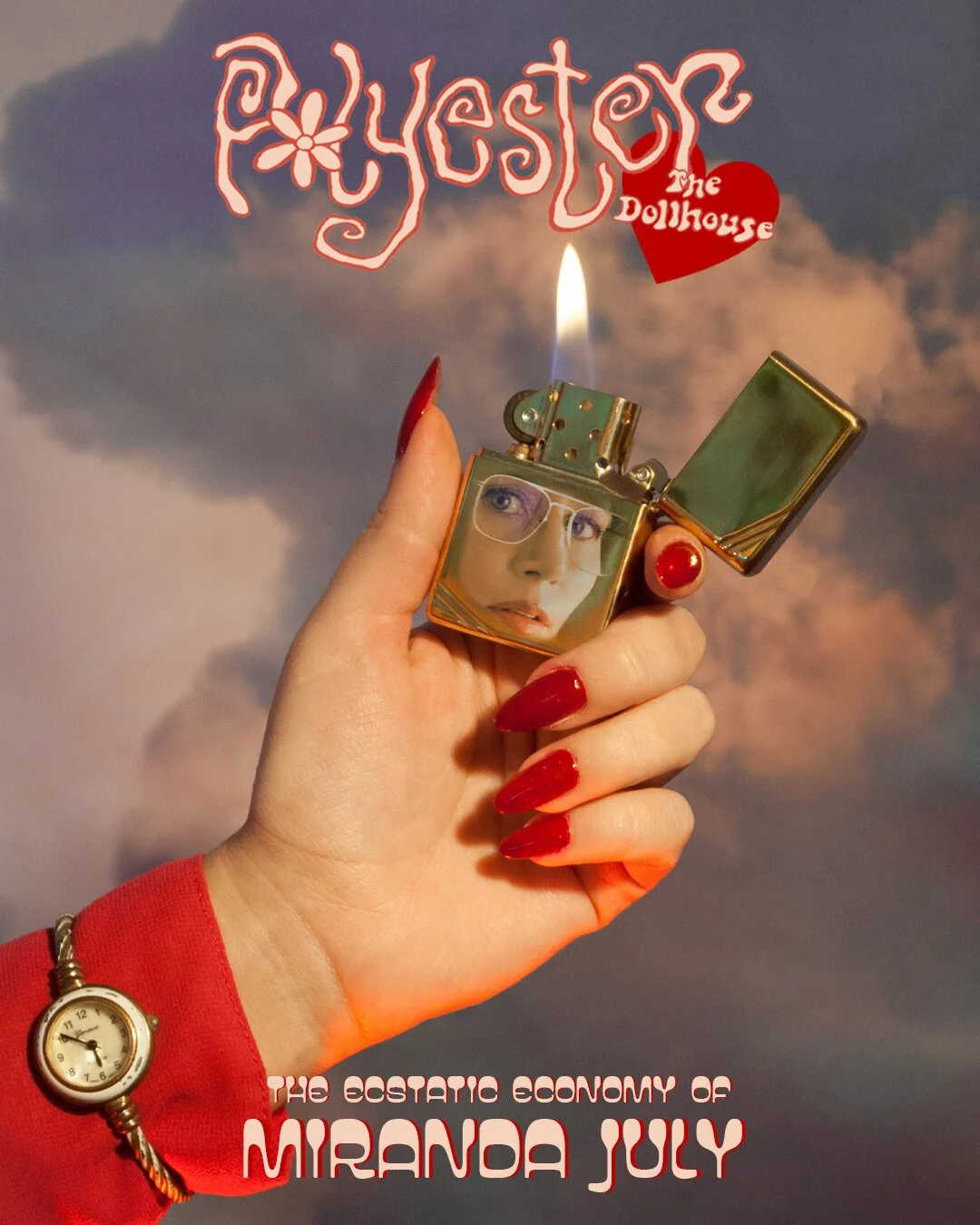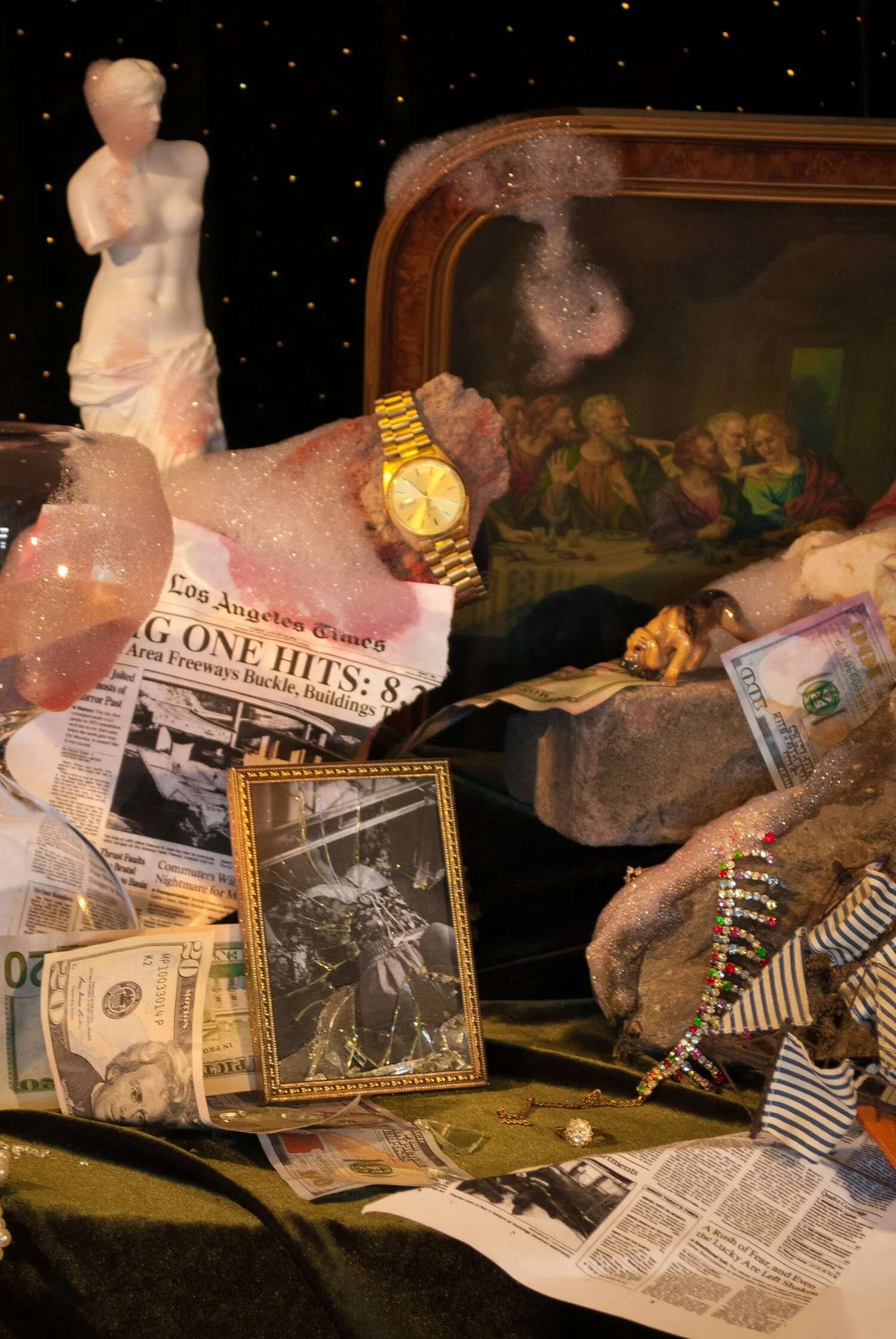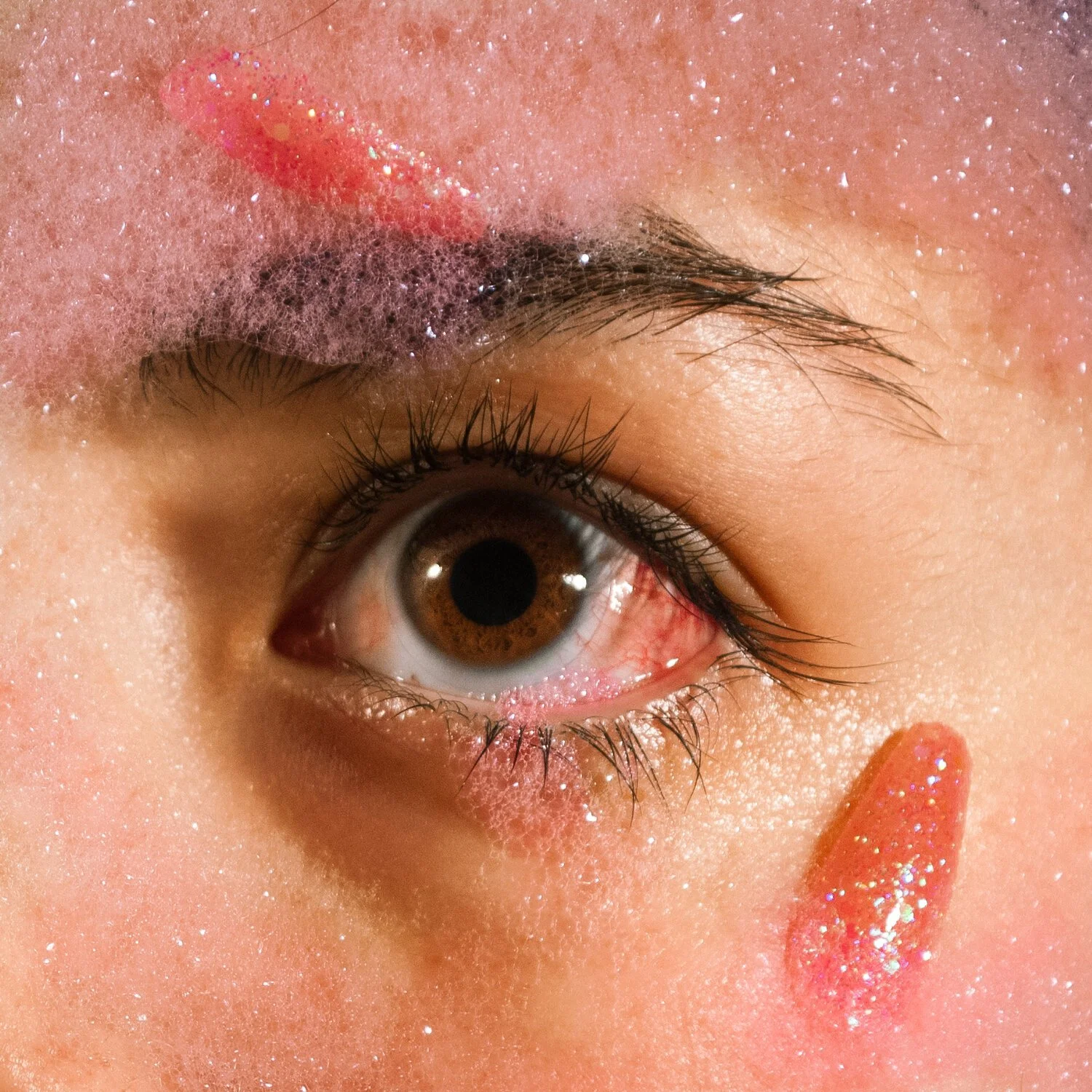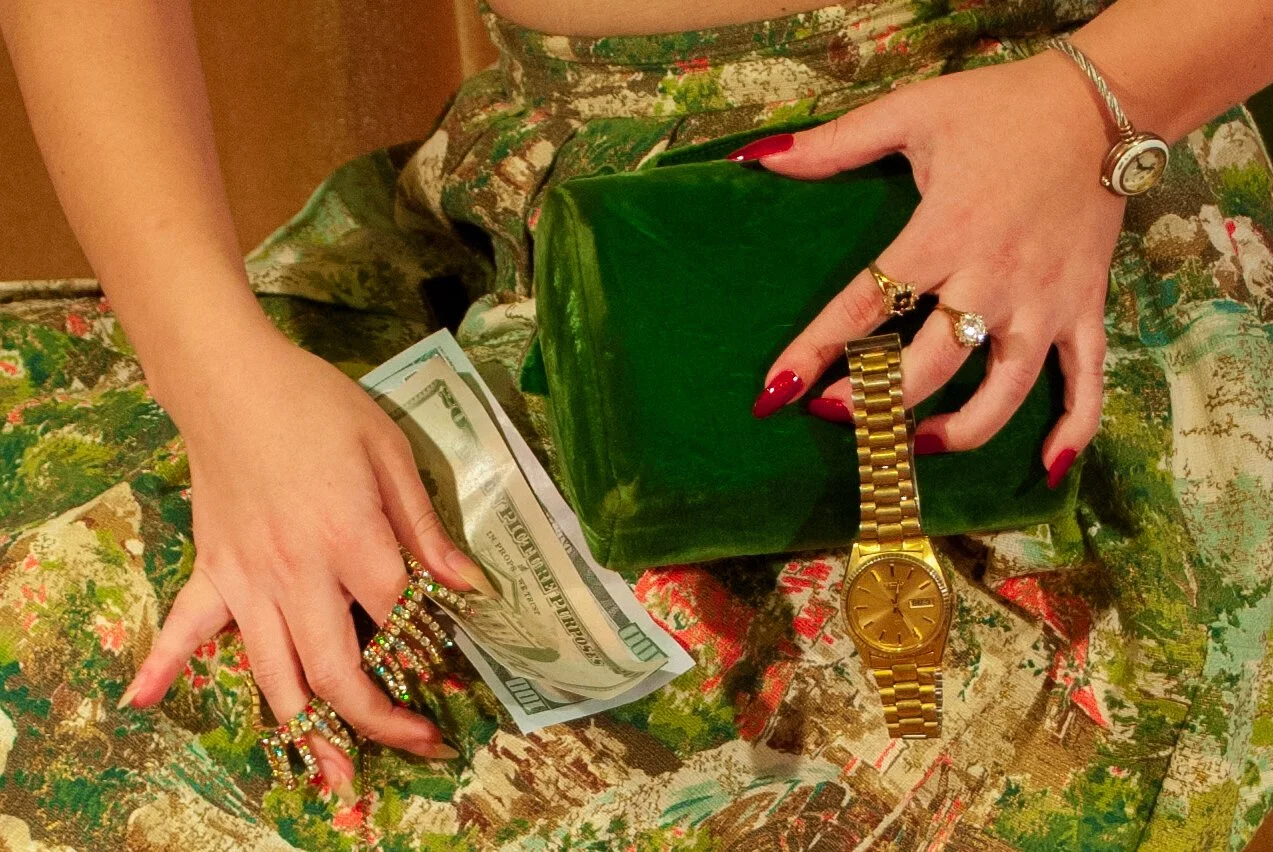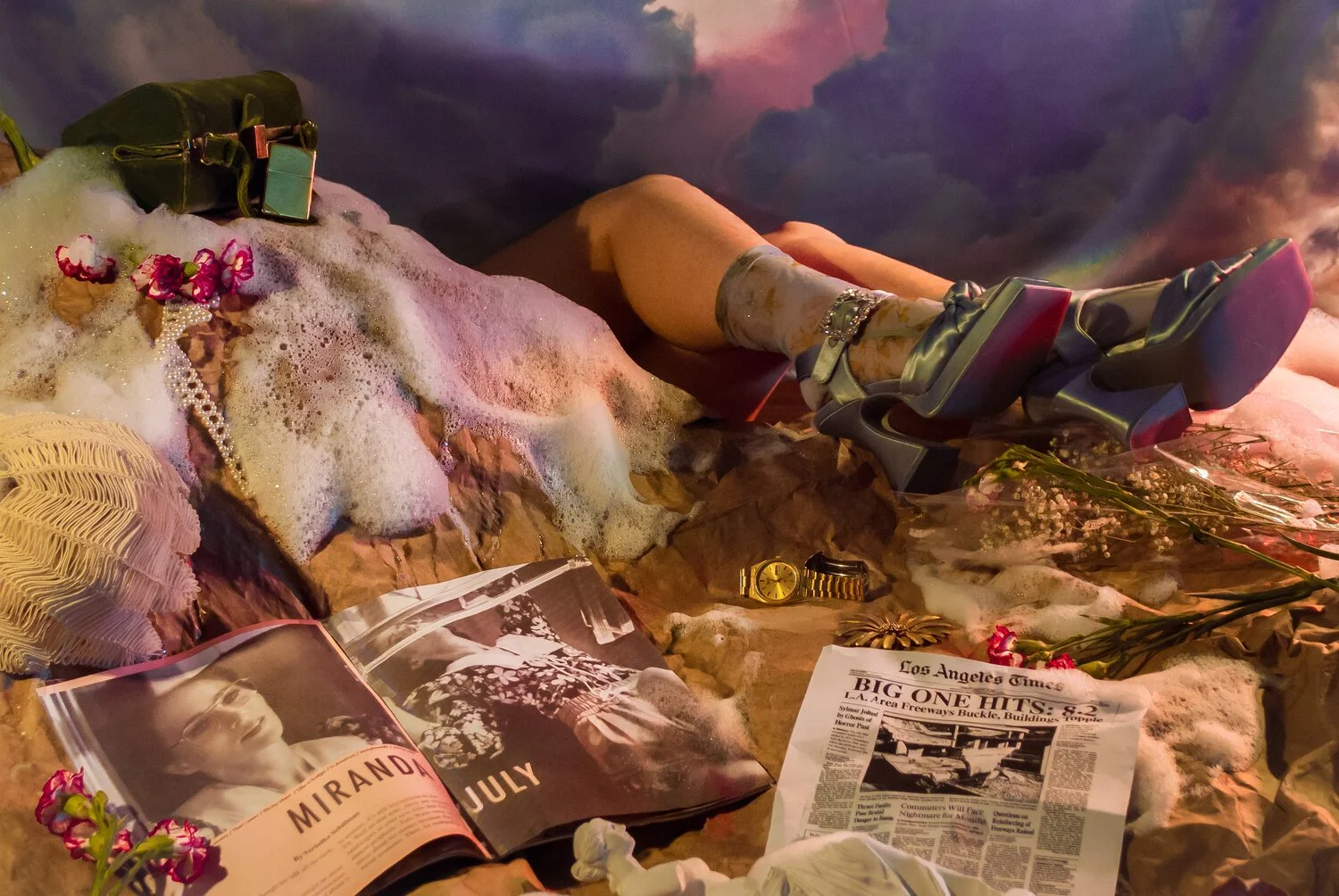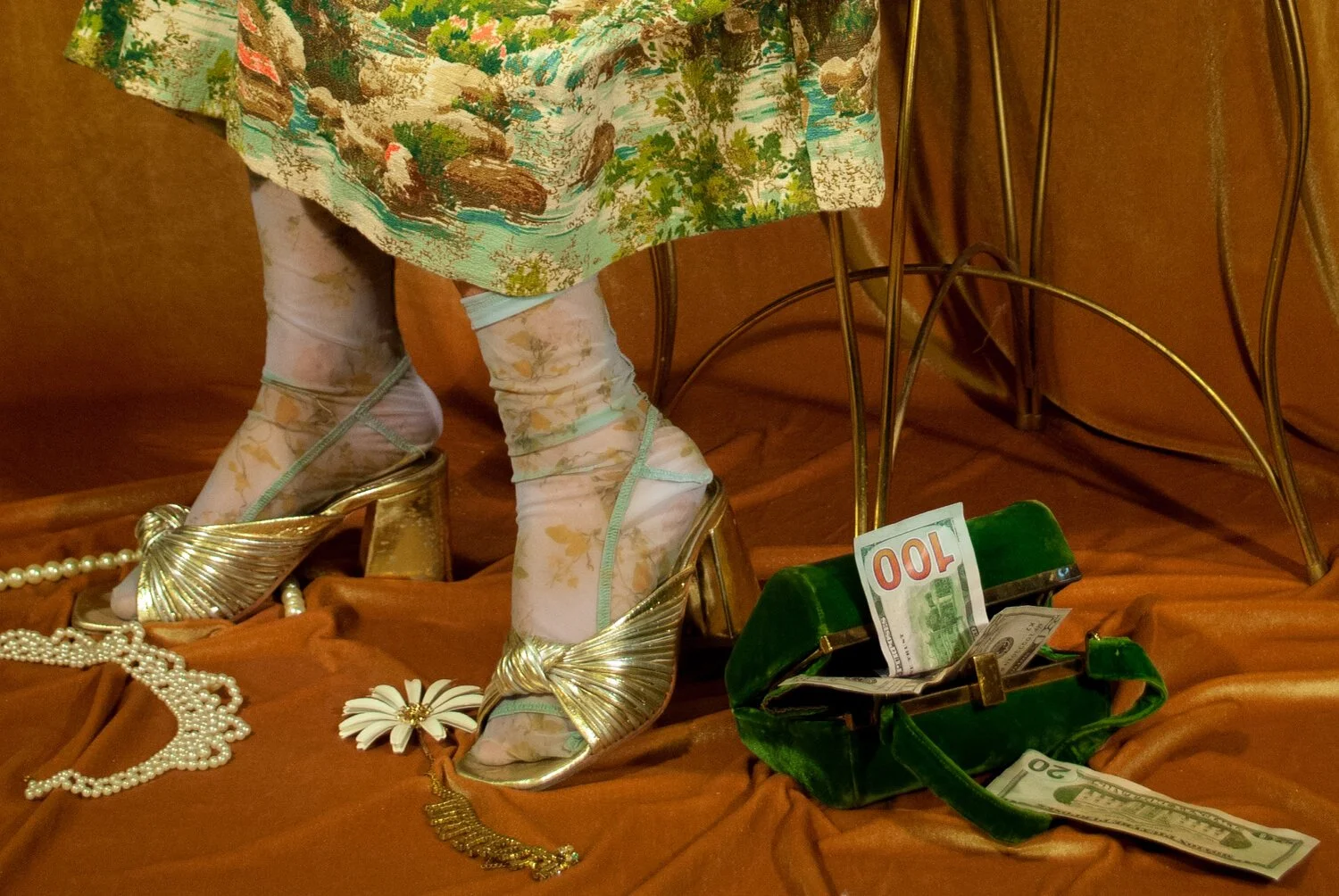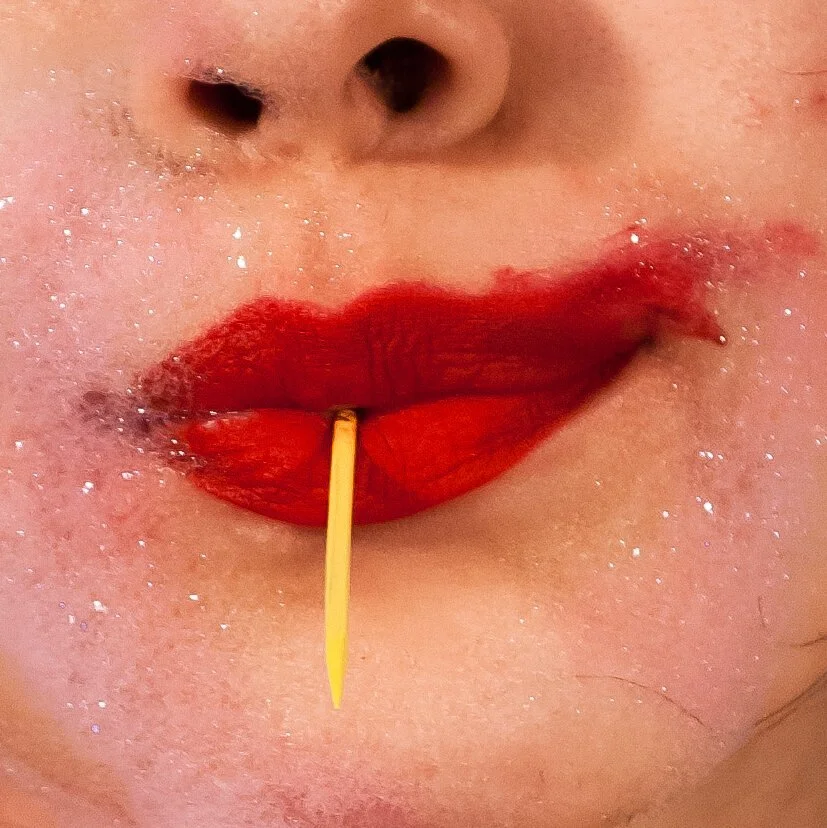Each Goddess A Trust Fund: The Ecstatic Economy of Miranda July
When Kajillionaire begins, you have no idea what you’re getting yourself into.
July’s unusual and androgynous heroine, Old Dolio (played by Evan Rachel Wood) feels for the world in a slouchy haze. At the same time, they tend to something so intricate in their own inner life that we cannot look away, even for a moment.
It is this person, in this myth, who will launch a thousand ships.
As a heist unravels in the foreground, a rustling can be felt underneath it. Melanie (embodied with breeziness by Gina Rodriguez) rescues Old Dolio from a family cannot afford to love their daughter.
The other day, I was sitting around a table as the sun was going down with July and the photographer Collier Schorr. Collier said that the film made her think that each family is its own country. I should divulge that over the past year, July and I have grown close. It started with a project and escalated into elaborate discussions on sparkly leotards, unrequited crushes, theory, and other things.
Every family is its own country. Yes!
And what if the inverse were true, as well?
What if each country were a family?
In both cases, the lines and laws are likely much more malleable than we’d care to admit.
Every institution is imagined, at the end of the day.
Every line was once a pencil, and every pencil a tree.
Where does a person stop and the world around her begin?
What might quarantine-wildfire-election-uprising-holiday season feel like, if everything were ours to work and re-work with July-like specificity?
___STEADY_PAYWALL___
Miranda July: Even though we talk all the time, I’m a little nervous.
Veronika Shulman: Me, too.
MJ: I must warn you that the film might be more articulate than me. I work from the unconscious, so at this point, before I’ve really talked about it to anyone, it’s still mysterious to me.
VS: Well on that note, there are moments and landscapes in your new film that feel uncanny, almost prophetic. Tom Waits once said he used to stress about his muses because they’d visit him at inconvenient moments. Then, he realized he was just a channel for something otherworldly. He changed his approach to, “Excuse me. Can you not see that I'm driving? If you're serious about wanting to exist, then I spend eight hours a day in the studio. You're welcome to come and visit me when I'm sitting at my piano. Otherwise, leave me alone and go bother Leonard Cohen.” Do you think artists, when attuned, can get in touch with a collective consciousness?
MJ: Well first of all, I would pull over. Are you crazy, Tom? That quote makes me nervous because you are given these gifts, and your only job is to receive them. People will suggest I take a break, and I think, “Do you take a break from God?”
VS: You are unafraid of the unknown?
MJ: I remember when I used to do performance work, it was often to an audience that was unacquainted, or even disgusted. “Miranda July” didn’t exist yet. But I realized, if I keep being vulnerable in the face of this, it’s almost like I have a superpower. And it actually protects me. It became a practice, in work and life. I curved into vulnerability.
VS: How?
MJ: It’s not easy, and inherent to it is doubt. But decades of swagger ultimately turn into you trusting your unconscious, something that isn’t yet real.
VS: That is deep. It reminds me of José Esteban Muñoz’, “…we may never touch queerness, but we can feel it as the warm illumination of a horizon imbued with potentiality…”
MJ: Which means living in unrest. You’re in a state of agitation and yet, there’s magic in that.
VS: Yes! But it’s rare to be that embodied. In an interview with Lena Dunham at the Brooklyn Academy of Music once, you described a crush you had on someone at a meditation retreat by saying, “I wanted her fingers inside of me.” I can’t say how much it means for a sentence like this to be rooted in materiality and realness, a feeling around rather than a declaration or categorization. Your queerness, like your creative work, feels celebratory and open-ended.
MJ: I’m not trying to claim anything other than just, my life.
VS: You’re married [to the brilliant Mike Mills], but from our chats, your nuanced experiences with your lovers feel very much like a part of who you are. Past, present, perhaps future. Can you elaborate on this, or give the people something to play with?
MJ: Hmmm. I’m picturing my first girlfriend; I sometimes thought of her pussy like a warm Danish. I remember pressing my face against the gentle pad of hair and just loving it, like an erotic pet that would split open. Like, it’s wet, how exciting. A pussy is like a pillow. You could almost live there. You can’t do that with a penis. Men at leisure are not so ready, whereas women are so sexy even at rest. You can write that I have a faraway look in my eyes.
[Giggles]
I mean, I didn’t really know any men for a stretch of years. Domestic life now feels subversively fluid, juxtaposed with how militant I was.
VS: Do you keep in touch with your exes?
MJ: One of my exes recently wrote a piece for a project I was making, and it was so abstract that it was completely incoherent. I suggested she maybe make it a bit more accessible. She never wrote me back.
VS: Relatable.
MJ: I often think of her, nevertheless, because this rubber dick I enjoy to this day was something that we got together. This is unforgivably entitled, but very Kajillionaire. We were young and wanted a sex toy but couldn’t afford one, so I walked into the store and grabbed it, while she waited outside and left the car running! I didn’t even try to hide it; I just ran.
VS: Wait, in what part of the world?
MJ: Portland. Probably a woman-owned business. There’s like no way to make this okay.
VS: Oh my God.
MJ: Another person I still think of was this butch who wore a kind of amazing perfume. I remember we did ecstasy and took photographs of each other, after we broke up. Then I missed the scent, so I bought the perfume for myself. For years to come, I smelled like them.
VS: Do you still talk to that person?
MJ: No, but I google them every few months.
VS: I like this idea that you don’t have to talk to be in touch. I guess there are many avenues to access someone, to honor them, which feels very you. I’ve been meaning to tell you, when I think of the characters in Kajillionaire, one thing that keeps coming up is a poem I adore, Eileen Myles’
Like a waterfall
A piece jewelry
That I wear
On my chest
Like a badge
In America
so my lover & I
can be safe
In the film, the rhythm of the more polished or feminine person protecting the more wild or masculine person so they can feel okay in society cuts deep. It reminds me of my relationships in a way that makes me feel very naked and visible. It’s not something I can remember being represented in a film, except for maybe children’s stories, like Tarzan or this movie I was obsessed with as a kid called Jungle 2 Jungle, about a girl who falls in love with this boy from, well, the jungle. It’s filled with the dad (Tim Allen, father to a thirteen-year-old Leelee Sobieski) making jokes like, “Well, welcome to the concrete jungle!” At the end of the film, the young lovers are in a canoe, a beautiful liminal space between nature and industry, and they kiss. It was so romantic. I cried for like, three days.
In your movie, Melanie takes a chance on a wild thing. In doing so, she opens a door to peaceful place that she and Old Dolio can inhabit, together. I just really want to express my gratitude. I’ve never seen anything like this in contemporary art, and yet it also feels like a fairytale, timeless and world-building. I felt like I was looking at a reflection of myself in a stream.
MJ: I just got tearful, as you were talking. Something was just seen that I didn’t even know needed seeing. Maybe there is something archetypal about those two, I think I know what you mean! Old Dolio can’t be reduced, she’s already the most elemental form of herself. It’s not about being masculine as much as it’s about being an outsider, a full soul who almost can’t talk.
VS: How did these characters come to you? They feel so real.
MJ: I was on vacation at a friend’s house sleeping in one big bed with Mike and Hopper, half-awake and trapped between them. I had a sleepy vision of these three people walking toward me. I didn’t know if I should fall back asleep and dream about them or wedge my way out and write it down. I wedged my way out and wrote it down. For the next few days, I was just in a daze, jotting down what seemed like a fairly far-fetched story. But I thought, “Who am I to judge?” When I saw Old Dolio in my sleepiness, my first thought was, “Oh, it’s you, my love.” My whole life, when I have felt my own beauty is when it serves as a healing balm for this kind of person. So then, I started writing Melanie.
VS: You suggest in doing this that it’s not so out there to be attracted to a person like Old Dolio. In a way, she/they are stoic, a Heath Ledger in Brokeback Mountain type.
MJ: Yes! A butch lesbian to me is more truly masculine than a man. If you’re into that sort of thing – tough survivors that are soft underneath that need your love —then men might not be enough. When you look at an androgynous female-bodied person’s photo in their fourth-grade yearbook, you think, “Okay, not one single day of that year was easy.” Whereas I look at many men and think, “What did you ever endure to earn your masculinity laurels? Nothing. They were just handed to you at birth.” Which makes them seem comparatively dainty, you know? Little princesses. That can have its own appeal, definitely, but it’s a whole other thing.
VS: You demonstrate to the audience that Old Dolio can be accepted and loved, as is.
MJ: Exactly. I am happy to disappoint anyone who was waiting for Old Dolio’s makeover. That is not this movie.
VS: The characters do surround themselves with ephemera, but on their own terms. Muñoz was into anti-evidence, “traces, glimmers, residues, and specks of things." What does the necklace in the film mean?
MJ: Hmm, let me consider that clue, from my unconscious.
[Giggles]
MJ: The necklace in the film could be a token of a belonging Old Dolio craves, but she can only get it if she lets it go. Sometimes you don’t get to feel like the beloved daughter, but you get to be something else. I do feel the second you release, something new rushes in. And it was usually there waiting for you, all along. I like things that are welcoming and available. If you make an object magical, you don’t have to say the word “magical.” And in the case of a film, you don’t even have to say the word “necklace.”
As a kid, I used to walk around looking for symbols if I needed inspiration. Every time, I found something. Once, there was an old metal clown’s head from about a hundred years ago. That felt almost a little too on the nose. So, talismans.
Plus, you know, gold and money are interesting, in the texture of a heist film. We are supposed to be happiest when we have the thing. But this is not always the case.
VS: I like that we are allowed to yearn for things. If love is something we give, rather than take, then we need no social contract to name ourselves as lovers. Instead, we choose this title for ourselves. Films like Moonlight or Call Me by Your Name pay similar homage to longing, even when unmet. Perhaps the crush in its essence belongs to this kind of queer odyssey. I see Kajillionaire in the contemporary canon, snuggled alongside these two.
MJ: Thank you.
VS: I only have one more question for you. As a tip of the hat to the teen magazines that raised me, are you an Old Dolio or a Melanie?
[Pause]
MJ: I’m the whole movie.
*******
Every girl is a movie.
Every family is a country.
Everything is more translucent in July’s mind: surreal, foamy, and somehow ours to grasp.
Each adolescence is its own tiny, kaleidoscope revolution.
I think of the title of the film, Kajillionaire.
What a nightmare to capitalism it would be, were we to all awaken to discover that the more we strip away, the more is really there.
We are not empty; we are vessels for our experiences. We can adorn our land with music, stars, joy, sugar, whatever we like. “Most happiness in life comes from dumb things.” The film is proof that we can choreograph our own democracies, in all of the ways our ancestors have (or have not).
We can take off our necklaces and wander, holding each other’s sweaty hands, to a more liberated existence. If we follow this road, even if it is uncertain, we might find angels, or at the very least mythical creatures, along the way. In this world, justice is not a bolt of thunder, but a mischievous whisper.
There is no gold at the end of the rainbow.
There is only the rainbow, and it does not end.
We are the treasurers of our own fate, and we bless our own America.
The work is the beauty.
The unrest is holy.
Everything of value
Is a verb.
“Like a bird on the wire, like a drunk in a midnight choir
I have tried in my way to be free”
Leonard Cohen
Epilogue
We give dandelion crowns to our investors
An afterthought & anthem, inspired by Kajillionaire (the new film from the mind of Miranda July)
“The small man
Builds cages for everyone
He knows.
While the sage,
Who has to duck his head
When the moon is low,
Keeps dropping keys all night long
For the
Beautiful
Rowdy
Prisoners.”
Hafiz
The subversive might not be the one who looks wild; she might be the one who thinks wild thoughts and looks like everybody else.
The most revolutionary moment in Kajillionaire upon watching & re-watching might be when Melanie (Gina Rodriguez) looks at Old Dolio (Evan Rachel Wood) in the grocery store at the end of the heist film and says, “I’m going to pay for these things.”
You can learn things in school and still, trust in your instinct. You can learn the rules of the game and decide not to play. You can learn how to steal and decide to pay. Miranda July guides us to design our own risk.
And what a thrill, to trust in your own embodiment.
To trade in the ephemeral.
To belong to a more iridescent bank.
To thrust into the world and make your wishes come, to you.
This paradigm fluidity is one of the endless encrusted jewels that queerness, as concept and practice, has bestowed upon society.
It is possible that queerness is not a sliver of the population,
But rather a radical welcoming of everything that anyone has ever desired.
It is the magic that asks for nothing back.
It is every sparkle that has ever been given away,
Every flower in every drag queen’s crown that has fallen to the ground,
It is every piece of crunched confetti at a daytime parade,
Every lover at a funeral who will remain unnamed.
Queerness is undefined because it is the thing that cannot be fathomed,
Only breathed or tasted.
It is the nougat at the center,
Nobody knows what it’s made of.
You do not have to know everything,
Because you already are everything.
You are a constellation, just like July shows us, and,
You are at the center of your belonging.
“No vanity displayed; I’m looking for the face I had before the world was made.” W.B. Yeats
Every dollar or accolade is extra credit,
Because you are enough.
Each community is tied together by a golden string,
Which is your imagination.
There is tragedy across the globe today.
Heartbreak, hunger, and hatred scorch the earth.
And yet, we are not baskets woven to hold this wreckage.
We are the horses who march through the snow. We are the sculptors, not the stone.
We vote, yes, and we make vaccines, but we do not live for chaos or dreams. We exist instead in an everflowing state of orgasmic groundedness with people and the planet. In forever freeness, in forever finding.
For this, this is the hunt,
And you are the hunter,
And we are each the food for thought,
Every human an answer to this ravenous reverent desperate silent eclectic ecstatic prayer.
For Muñoz, after Miranda.
Artwork / Photography by @camillemariet | Portraits of Miranda by @diegouchitel | Writer: @veronikadoeslife | Creative Direction: @ionegamble
🔥KAJILLIONAIRE is now in theatres & streaming globally.
Listen to Miranda talk with Ione & Olivia on OBSESSIONS, the Polyester podcast.

